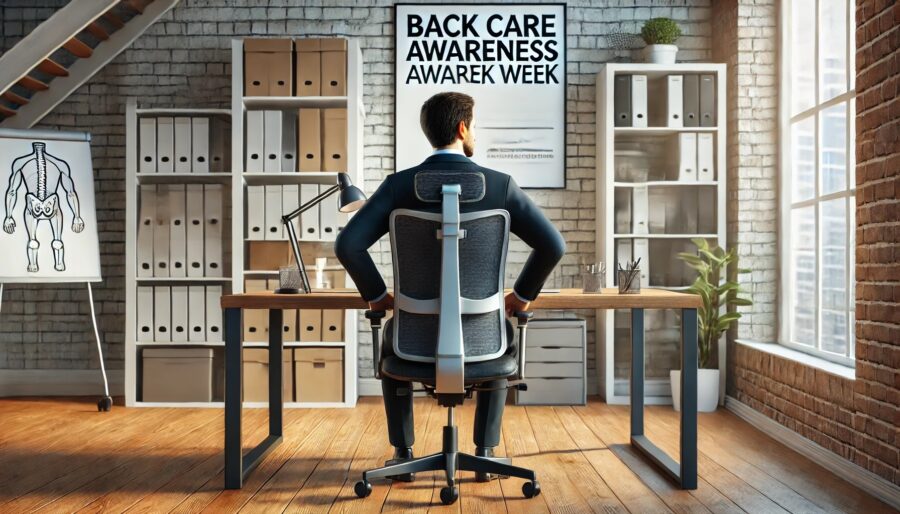Back Care Awareness Week, running from 2nd to 8th October, is an excellent opportunity for employers to focus on promoting back health among their employees.
Poor back health can significantly impact overall wellbeing, productivity, and job satisfaction. As HR professionals, fostering a culture of awareness and prevention is crucial in maintaining a healthy and productive workforce.
The Impact of Bad Working Habits on Back Health
Bad working habits, such as prolonged sitting, poor posture, and inadequate ergonomics, can lead to chronic back pain and other musculoskeletal issues. These problems not only cause discomfort but can also lead to long-term health issues, reduced productivity, and increased absenteeism.
Key factors contributing to poor back health in the workplace include:
- Prolonged Sitting: Sitting for extended periods can cause stiffness and strain in the lower back, leading to pain and discomfort.
- Poor Posture: Slouching or leaning forward can put undue stress on the spine, causing misalignment and muscle tension.
- Inadequate Ergonomics: Using improperly adjusted chairs, desks, and computer setups can contribute to back strain and discomfort.
Tips for Employers to Promote Back Health
- Ergonomic Assessments: Conduct regular ergonomic assessments to ensure that workstations are set up correctly. Adjust chairs, desks, and computer monitors to promote proper posture and reduce strain on the back.
- Encourage Regular Breaks: Encourage employees to take regular breaks to stand, stretch, and move around. Implementing a “5-minute stretch every hour” policy can help prevent stiffness and improve circulation.
- Promote Active Sitting: Provide options for active sitting, such as sit-stand desks or stability ball chairs, to encourage movement and reduce prolonged static postures.
- Posture Education: Offer workshops or distribute educational materials on the importance of good posture. Teach employees how to sit, stand, and move correctly to minimize back strain.
- Exercise Programs: Implement workplace wellness programs that include exercises to strengthen the back and core muscles. Yoga, pilates, and strength training can help improve posture and prevent back pain.
- Supportive Chairs and Equipment: Invest in high-quality, supportive office chairs and ergonomic accessories such as footrests, lumbar supports, and monitor risers.
- Flexible Work Arrangements: Allow flexible work arrangements, including remote work options and varied schedules, to reduce the strain of long commutes and rigid working hours.
Promoting Awareness During Back Care Awareness Week
Use Back Care Awareness Week as a platform to highlight the importance of back health. Organise events, send out informative newsletters, and share tips on maintaining a healthy back. Engage employees through interactive sessions with physiotherapists or ergonomic specialists.
Further Reading and Resources
For more detailed information on back care and ergonomics, HR professionals can refer to the following resources:
- BackCare – The National Back Pain Association
- NHS – Back Pain
- Health and Safety Executive (HSE) – MSD Toolkit
Workplace Wellbeing Professional & Back Care
To read some of our exclusive feature articles contributed by wellbeing professionals, follow the links below (with much more news and features to be found under ‘back pain’ in the topic index):
- Salman Haq: Ergonomic solutions for healthier employees
- Peter Grinbergs: The backbone of a healthy workplace – support musculoskeletal wellness in your team
- Sukh Padda: The burden of neck and back pain in the UK
Joanne is the editor for Workplace Wellbeing Professional and has a keen interest in promoting the safety and wellbeing of the global workforce. After earning a bachelor's degree in English literature and media studies, she taught English in China and Vietnam for two years. Before joining Work Well Pro, Joanne worked as a marketing coordinator for luxury property, where her responsibilities included blog writing, photography, and video creation.



